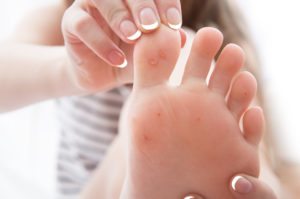What Is a Blister?
A blister is a small pocket of body fluid (lymph, serum, plasma, blood, or pus) within the upper layers of the skin, typically caused by forceful rubbing (friction), burning, freezing, chemical exposure or infection. Most blisters are filled with a clear fluid, either serum or plasma.
Blister Causes
Improperly fitting shoes, and the rubbing or friction you get with them, are the main causes of blisters.
In addition, you can also get blisters from vigorous activity – even when your shoes fit properly and be sure your shoes are designed for your intended activity. Shoes designed for running are not good basketball courts shoes. Friction is the main factor, so any repetitive movement involving your feet can lead to blisters.
Even with properly fitting, quality shoes you can develop blister do to: friction or rubbing, extreme temperature, chemical exposure, moisture, crushing and pinching.
Prevention
Blisters are more likely to develop on skin that is moist, so socks that manage moisture or frequent sock changes will aid those with particularly sweaty feet. While exercising or playing sports, special sports socks can help keep feet drier and reduce the chance of blisters. Before going for a long walk, it is also important to ensure that shoes or hiking boots have been properly broken in.
Lubricants help reduce friction by keeping skin-to-skin or skin-to-shoe areas wet and slick.
Powders and antiperspirants work in an opposite manner to reduce friction by keeping feet very dry. Lightly apply an over-the-counter powder or antiperspirant directly to your clean and dry feet.
Hydration – Avoid blisters caused by swollen feet by keeping your fluid and electrolyte levels balanced.
If you do get a blister, be patient and try to leave it alone. Most blisters heal on their own in one to two weeks. Don’t resume the activity that caused your blister until it’s healed.
As your blister heals, watch for signs of an infection. If you notice any redness, pus, or increased pain or swelling, make an appointment to see your doctor.

